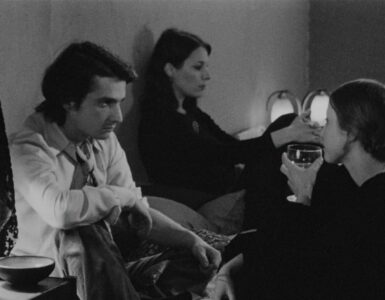With any great filmmaker comes his or her first step into the filmmaking pool. Often times the director’s most inspired and experimental attempt at filmmaking, the debut feature can also often times be his or her best feature. Citizen Kane, often regarded as the greatest film ever made, was Orson Welles’ first attempt at filmmaking. Reservoir Dogs was Quentin Tarantino’s auspicious debut behind the camera (at least in any major form), and Hell, Criterion has made a business out of releasing the first features from iconic filmmakers ranging from French New Wavers like Francois Truffaut (400 Blows), punk rock naturalists like John Cassavetes (Shadows), or even modern iconoclasts, like Wes Anderson (Bottle Rocket) and Lena Dunham (Tiny Furniture). However, very few filmmakers have the chance to make such a singular mark with a debut, and a subsequent career, quite like director Derek Jarman.
Co-directed by he and Paul Humfress, Sebastiane marked the debut for Jarman, a filmmaker known for many things. Be it his relationship with muse Tilda Swinton, his audacious and utterly moving use of the naked male form, or his shocking death in 1994, Jarman became an icon both in the experimental art house movement as well as the LGBT movement, where he is still considered a watershed voice. A breathtaking look at the life of Saint Sebastiane, Sebastiane is a stunningly lively film that feels as vital and influential today as it ever has.
Opening with a scene of a man painted entirely in white dancing in the center of a group of men, for a lack of better words, frolicking around him, the film is far from your standard period drama, instead focusing on the time Sebastiane spent in exile, only to be martyred. A truly erotic feature, the film turns the ‘male gaze’ upon itself, gloriously photographing the male form, following the story of a group of men and their interaction with an antagonistic psycho-sexual Roman captain, whose pagan faith doesn’t match well with Sebastiane’s Christian beliefs. Scored by one Brian Eno, this film is easily one of the most singular and important debuts of the late-1970s.
Shot entirely in vulgar Latin, Jarman is far and away the film’s biggest star. Turning his camera erotically upon the male body, the film is absolutely breathtaking. Almost a then-modern Pasolini film, Sebastiane features glorious earth-toned photography and a brilliantly framed camera, all giving this narrative a very thoughtful and pensive aesthetic. Taking cues from bluntly heterosexual filmmakers, Jarman turns the camera, which has always had a thing for erotically shooting female actors, on the male form, giving us moving looks at Sebastiane as he was seen by the man who ultimately called for his death; a sexual entity. Inherently a film about longing, both of the body and of the spirit, Sebastiane is absolutely moving, blending erotically tinged sequences of men playfully messing with one another and the heady ideas that Jarman would later expand upon throughout his all-too-short career, in an esoteric, daring, bombastic and brilliant debut feature.
Performed entirely in what is simply a dead language, vulgar Latin, the film is inherently distinct. Leonardo Treviglio plays Sebastiane, and while this isn’t truly a performance piece, he’s no slouch. As a Jarman-shot actor, he must use his body to its fullest extent, and he is as good as they come. Never one to shy away from putting everything on the screen, Treviglio, and frankly the entire cast, give some of the most brave and affecting performances you’ll find.
Absolutely unlike anything you will see or have ever seen, Sebastiane is a lush and erotic look at both a man martyred for his beliefs, as well as a story inherently looking at the longing of a man, both of his body and soul, all wrapped up in a vital piece of filmmaking that has no comparison. Inspiring an entire generation of LGBT filmmakers, this is a touchstone for a movement, and a touchstone for cinema as an entity. Now currently available on Blu-ray thanks to Kino, this is a must own Blu-ray release. Jarman’s filmmaking was meant to be seen in HD, and with a new audio and visual transfer, the film has never looked as good. The earth tones come alive, as does the truly archaic language Jarman used for his actors. Hitting along with a handful of other films from Jarman’s canon, this is a filmography that must be re-visited, or seen for the first time, as it’s one that truly has no comparison.






![Bergman Island (The Criterion Collection) [Blu-ray]](https://criterioncast.com/wp-content/uploads/2022/11/bergman-island-the-criterion-collection-blu-ray-400x496.jpg)
![This Is Not a Burial, It’s a Resurrection (The Criterion Collection) [Blu-ray]](https://criterioncast.com/wp-content/uploads/2022/11/this-is-not-a-burial-its-a-resurrection-the-criterion-collection-blu-ray-400x496.jpg)
![Lars von Trier's Europe Trilogy (The Criterion Collection) [The Element of Crime/Epidemic/Europa] [Blu-ray]](https://criterioncast.com/wp-content/uploads/2022/11/lars-von-triers-europe-trilogy-the-criterion-collection-the-element-of-400x496.jpg)
![Imitation of Life (The Criterion Collection) [Blu-ray]](https://criterioncast.com/wp-content/uploads/2022/11/imitation-of-life-the-criterion-collection-blu-ray-400x496.jpg)
![The Adventures of Baron Munchausen (The Criterion Collection) [4K UHD]](https://criterioncast.com/wp-content/uploads/2022/11/the-adventures-of-baron-munchausen-the-criterion-collection-4k-uhd-400x496.jpg)
![Cooley High [Criterion Collection] [Blu-ray] [1975]](https://criterioncast.com/wp-content/uploads/2022/11/cooley-high-criterion-collection-blu-ray-1975-400x496.jpg)